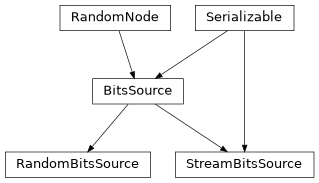Bit Sources¶

Bit sources represent, as the title suggest, a source of (hard) communication bits
to be transmitted over a modem.
They are one of the default configuration parameters of a TransmittingModem.
Every bit source implementation is expected to inherit from the BitsSource base class,
which in turn represents a random node.
There are currently two basic types of bit sources available:
RandomBitsSourceinstances implement a random stream of bitsStreamBitsSourceinstances implement a deterministic stream of bits
- class BitsSource(seed=None)[source]¶
Bases:
RandomNode,SerializableBase Class for Arbitrary Streams of Communication Bits.
Inheriting classes are required to implement the
generate_bits()routine.
- class RandomBitsSource(seed=None)[source]¶
Bases:
BitsSourceBit stream generator for pseudo-random sequences of bits.
- classmethod Deserialize(process)[source]¶
Deserialize an object’s state.
Objects cannot be deserialized directly, instead a
Factorymust be instructed to carry out the deserialization process.- Parameters:
process (
DeserializationProcess) – The current stage of the deserialization process. This object is generated by theFactoryand provides an interface to deserialization methods supporting multiple backends.- Return type:
- Returns:
The deserialized object.
- generate_bits(num_bits)[source]¶
Generate a new sequence of bits.
Returns: A numpy vector of num_bits generated bits.
- serialize(process)[source]¶
Serialize this object’s state.
Objects cannot be serialized directly, instead a
Factorymust be instructed to carry out the serialization process.- Parameters:
process (
SerializationProcess) – The current stage of the serialization process. This object is generated by theFactoryand provides an interface to serialization methods supporting multiple backends.- Return type:
- class StreamBitsSource(path)[source]¶
Bases:
BitsSource,SerializableBit-stream generator mapping representing file system streams as bit sources.
- Parameters:
path (
str) – Path to the stream bits source.
- classmethod Deserialize(process)[source]¶
Deserialize an object’s state.
Objects cannot be deserialized directly, instead a
Factorymust be instructed to carry out the deserialization process.- Parameters:
process (
DeserializationProcess) – The current stage of the deserialization process. This object is generated by theFactoryand provides an interface to deserialization methods supporting multiple backends.- Return type:
- Returns:
The deserialized object.
- generate_bits(num_bits)[source]¶
Generate a new sequence of bits.
Returns: A numpy vector of num_bits generated bits.
- serialize(process)[source]¶
Serialize this object’s state.
Objects cannot be serialized directly, instead a
Factorymust be instructed to carry out the serialization process.- Parameters:
process (
SerializationProcess) – The current stage of the serialization process. This object is generated by theFactoryand provides an interface to serialization methods supporting multiple backends.- Return type: